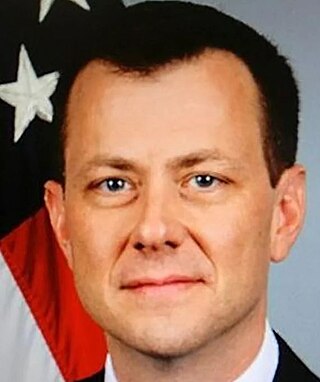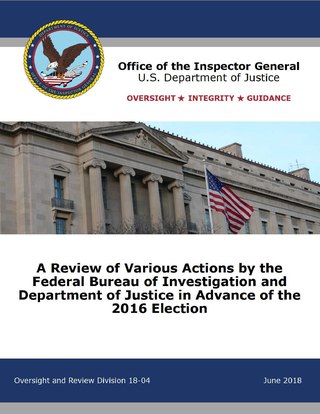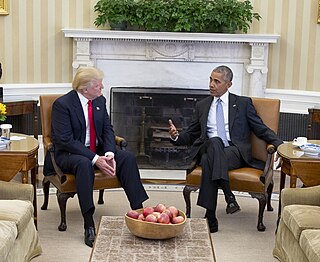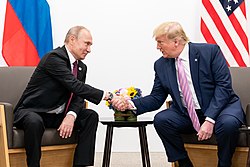Spygate is a disproven conspiracy theory peddled by 45th U.S. president Donald Trump and his political base on many occasions throughout his presidential term. It primarily centered around the idea that a spy was planted by the Obama administration to conduct espionage on Trump's 2016 presidential campaign for political purposes. On May 17, 2018, Trump tweeted: "Wow, word seems to be coming out that the Obama FBI 'SPIED ON THE TRUMP CAMPAIGN WITH AN EMBEDDED INFORMANT.'" In that tweet, he quoted Andrew C. McCarthy, who had just appeared on Fox & Friends repeating assertions from his own May 12 article for National Review.

Carter William Page is an American petroleum industry consultant and a former foreign-policy adviser to Donald Trump during his 2016 presidential election campaign. Page is the founder and managing partner of Global Energy Capital, a one-man investment fund and consulting firm specializing in the Russian and Central Asian oil and gas business.

The Russian government was one of several foreign governments that interfered in the 2016 United States elections, with the goals of sabotaging the presidential campaign of Hillary Clinton, boosting the presidential campaign of Donald Trump, and increasing political and social discord in the United States. According to the U.S. intelligence community, the operation—code named Project Lakhta—was ordered directly by Russian president Vladimir Putin. The "hacking and disinformation campaign" to damage Clinton and help Trump became the "core of the scandal known as Russiagate". The 448-page Mueller Report, made public in April 2019, examined over 200 contacts between the Trump campaign and Russian officials but concluded that there was insufficient evidence to bring any conspiracy or coordination charges against Trump or his associates.
Christopher David Steele is a British former intelligence officer with the Secret Intelligence Service (MI6) from 1987 until his retirement in 2009. He ran the Russia desk at MI6 headquarters in London between 2006 and 2009. In 2009, he co-founded Orbis Business Intelligence, a London-based private intelligence firm.

The Steele dossier, also known as the Trump–Russia dossier, is a controversial political opposition research report compiled by Christopher Steele that was published without permission as an unfinished 35-page compilation of "unverified, and potentially unverifiable" raw intelligence reports—"not established facts, but a starting point for further investigation". It was written from June to December 2016 and contains allegations of misconduct, conspiracy, and cooperation between Donald Trump's presidential campaign and the government of Russia prior to and during the 2016 election campaign. Steele was the first to warn that Russia was seeking to elect Trump, and several other key dossier allegations made in June 2016 about the Russian government's efforts to get Trump elected were later described as "prescient" because they were corroborated six months later in the January 2017 report by the Office of the Director of National Intelligence and the Mueller Report, namely that Vladimir Putin favored Trump over Hillary Clinton; that he personally ordered an "influence campaign" to harm Clinton's campaign and to "undermine public faith in the US democratic process"; that he ordered cyberattacks on both parties; and that many Trump campaign officials and associates had numerous secretive contacts with Russian officials and agents.
Since Donald Trump was a 2016 candidate for the office of President of the United States, myriad suspicious links between Trump associates and Russian officials have been discovered by the FBI, Special counsel, and several United States congressional committees, as part of their investigations into the Russian interference in the 2016 United States elections. Following intelligence reports about the Russian interference, Trump and some of his campaign members, business partners, administration nominees, and family members were subjected to intense scrutiny to determine whether they had improper dealings during their contacts with Russian officials. Several people connected to the Trump campaign made false statements about those links and obstructed investigations. These investigations resulted in many criminal charges and indictments.
George Demetrios Papadopoulos is an author and former member of the foreign policy advisory panel to Donald Trump's 2016 presidential campaign. On October 5, 2017, Papadopoulos pleaded guilty to a felony charge of making false statements to FBI agents about the timing and the possible significance of his contacts in 2016 relating to U.S.–Russia relations and the Trump presidential campaign. In 2018, he served twelve days in federal prison, then was placed on a 12-month supervised release.

Peter Paul Strzok II is a former United States Federal Bureau of Investigation (FBI) agent. He was the Deputy Assistant Director of the FBI's Counterintelligence Division and led the investigation into Russian interference in the 2016 United States elections. Previously, he had been the chief of the division's Counterespionage Section and led the investigation into Hillary Clinton's use of a personal email server.
The FBI secret society is a conspiracy theory claiming the existence of a group of U.S. Federal Bureau of Investigation (FBI) employees with a collective goal of undermining the Presidency of Donald Trump. The claim was based on the content of a text message sent between two employees of the FBI in 2016. The content of the message was later revealed to likely be a joke and the conspiracy theory was proven false.
This is a timeline of major events in the first half of 2017 related to the investigations into links between associates of Donald Trump and Russian officials and spies that are suspected of being inappropriate, relating to Russian interference in the 2016 United States elections. Following the timeline of Russian interference in the 2016 United States elections before and after July 2016 up until election day November 8 and the post-election transition, this article begins with Donald Trump and Mike Pence being sworn into office on January 20, 2017, and is followed by the second half of 2017. The investigations continued in the first and second halves of 2018, the first and second halves of 2019, 2020, and 2021.

A Review of Various Actions by the Federal Bureau of Investigation and Department of Justice in Advance of the 2016 Election is the official 568-page report of the actions taken by the FBI and Department of Justice (DOJ) during the 2016 U.S. presidential election connected with Hillary Clinton's use of a private email server, prepared by the Department of Justice Office of the Inspector General (OIG) "in response to requests from numerous Chairmen and Ranking Members of Congressional oversight committees, various organizations, and members of the public."
The 2017-2019 Special Counsel investigation involved multiple legal teams, specifically the attorneys, supervised by Special Counsel Robert Mueller, taking part in the investigation; the team representing President Trump in his personal capacity; and the team representing the White House as an institution separate from the President.
Crossfire Hurricane was the code name for the counterintelligence investigation undertaken by the Federal Bureau of Investigation (FBI) from July 31, 2016, to May 17, 2017, into links between Donald Trump's presidential campaign and Russia and "whether individuals associated with [Trump's] presidential campaign were coordinating, wittingly or unwittingly, with the Russian government's efforts to interfere in the 2016 U.S. presidential election". Trump was not personally under investigation until May 2017, when his firing of FBI director James Comey raised suspicions of obstruction of justice, which triggered the Mueller investigation.
The Comey Rule is an American political drama television miniseries written and directed by Billy Ray, based on the book A Higher Loyalty: Truth, Lies, and Leadership by former FBI director James Comey. The miniseries stars Jeff Daniels as Comey and Brendan Gleeson as President Donald Trump. It aired in two parts from September 27 to September 28, 2020, on Showtime.
The Russia investigation origins counter-narrative, or Russia counter-narrative, is a narrative embraced by Donald Trump, Republican Party leaders, and right-wing conservatives attacking the legitimacy and conclusions of investigations into Russian interference in the 2016 elections, and the links between Russian intelligence and Trump associates. The counter-narrative includes conspiracy theories such as Spygate, accusations of a secretive, elite "deep state" network, and other false and debunked claims. Trump in particular has attacked not only the origins but the conclusions of the investigation, and ordered a review of the Mueller report, which was conducted by attorney general William Barr – alleging there was a "deep state plot" to undermine him. He has claimed the investigations were an "illegal hoax", and that the "real collusion" was between Hillary Clinton, Democrats, and Russia – and later, Ukraine.
This is a timeline of events related to Russian interference in the 2016 United States elections.

United States v. Flynn was a criminal case in the United States District Court for the District of Columbia which was dismissed without any convictions in December 2020 following a presidential pardon. Michael Flynn, a retired lieutenant general in the United States Armed Forces, had accepted President-elect Donald Trump's offer for the position of National Security Advisor in 2016 and then briefly served as National Security Advisor. He pleaded guilty to one count of making false statements to the Federal Bureau of Investigation. Flynn's alleged false statements involve conversations he had with Russian Ambassador Sergey Kislyak when Flynn was incoming National Security Advisor to President-elect Trump, and Flynn agreed to cooperate with the Special Counsel investigation as part of a plea deal.
Igor Yurievich Danchenko is a Russian citizen and U.S. resident currently residing in Virginia who works as a Eurasia political risk, defense and economics analyst. Together with Clifford Gaddy he analyzed Vladimir Putin's 1996 university dissertation and presented examples of plagiarism. In July 2020, Danchenko was revealed to have worked for Christopher Steele's Orbis Business Intelligence as a source for the Steele dossier. In November 2021, he was indicted on charges of lying to the FBI about the identities of his sources but "not about the information [in the dossier] itself". He was acquitted of all charges in October 2022.

As part of a large and baseless conspiracy theory, Donald Trump posited that Barack Obama had spied on him, which Trump described as "the biggest political crime in American history, by far." The series of accusations have been nicknamed Obamagate. Obama had served as President of the United States from 2009 until 2017, when Trump succeeded him; Trump served as president until 2021.
Charles McGonigal is a former American Federal Bureau of Investigation special agent in charge of counterintelligence in the FBI's New York City field office. In 2016 and 2017, as a supervisor in the New York Office, he led investigations into Russian interference in the 2016 United States elections and Russian efforts to aid Donald Trump’s 2016 presidential campaign, including by Russian oligarch Oleg Deripaska. In December 2023 McGonigal was sentenced to 50 months in prison for conspiring with Deripaska to violate U.S. sanctions on Russia. In February 2024, McGonigal was sentenced to an additional 28 months in prison for concealing payments he received from a former Albanian intelligence employee. During McGonigal’s time in a supervisory position in the New York Field Office, the office was marked by controversial leaks.








